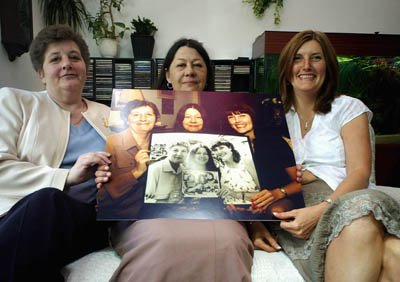
I caught 49 Up — the latest in the series of films that Michael Apted has shot every seven years since the 1960s, documenting the lives of a dozen Britons — at the Cinematheque a few nights ago.
The only other film in this series that I have seen is 28 Up (1985), and since it does not appear in the film journals that I have kept since 1989, I can only assume I saw it even earlier than that — back when I was still a teenager. I recognized some of the bits from that film that appeared in the new film, and it was strange to think that, the last time I had seen those clips, all the characters in them had been a decade or so older than me and in some sense had represented possible futures for me — whereas now, all the people in those clips are nearly a decade younger than I am now.
It was also strange to realize just how tumultuous the lives of some of these people had been since I last checked in with them, and to realize that, for some people in the audience, these developments would not have been a surprise, because there had already been two other films documenting these developments since then.
The biggest change between 28 Up and 49 Up, it seems to me, is that the series may have lost some of its political impact, though in some sense it may still be politically significant.
What I mean by that is this: To judge by the clips we see of the original film, Seven Up! (1964), the series was initially conceived as a way of seeing “the future of Britain”. (The narrator in that film even talks about the year 2000, which is now in the past!) The point of the first film — inspired by the Jesuit maxim “Give me the child until he is seven and I will give you the man” — apparently had something to do with the rigidity of the class system in England, and the first few sequels bore this out; I vaguely remember reviews of 28 Up underscoring how everyone’s lives turned out exactly the way you’d expect from the first film.
But I’m not sure 49 Up supports that point any more — or at any rate, the point has become more complicated, thanks to the subjects themselves. For example, the upper-class boy who, at age seven, predicted which schools he would go to, and then went to those schools and followed the career path laid out for him in his youth, has now changed course and found a different job. And a number of the other interviewees have also begun to define themselves in ways that suggest they are taking control of their own lives and coming to “own” them more, now. (Most heartening, in this regard, is the former homeless man who is now actively involved in local politics — and who seems to have moved beyond the doubts of his earlier years towards some sort of faith in God.)
Granted, the choices that these people make are still limited and influenced by their backgrounds, but they don’t seem so determined — or, more to the point, predetermined — any more.
In addition, a number of the interviewees have moved out of the country altogether — to America, to Australia, even to Spain — and very few of the people that grew up in East London live in their old neighbourhood any more. They say that the neighbourhood has changed, it’s no longer the place for them, and the film gives us just the briefest of glimpses of the burgeoning immigrant communities that now reside there. So, to what degree does this series represent “the future of Britain”, now?
One of the interviewees tells the director, somewhat testily, that this just might be the first film in the series that is about them, and not about the director’s idea of them; and, in a sense, her comment could be targeted not just at the filmmakers who began the series with a certain idea about class structures, but at the structures themselves and the society that set them up.
Meanwhile, one of the other interviewees remarks dismissively that this series is a little like a precursor to the “reality TV” shows of today, and he admits that catching up with a dozen people every seven years and following them as they get older must be “fascinating”, but he’s not sure it really means anything.
I think he has a point. I’m not really sure what the series “means” any more either. But yes, it still is fascinating.
And the fact that most of these people seem reasonably content with their lives at 49 — even though a number of them had significant troubles at 28, 35 and 42 — is kind of reassuring, too.












